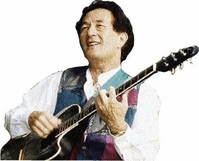STORY OF THE SONG: 'Jamaica Ska' lifts beat over barbed wire
Published: Sunday | October 11, 2009

Keith Lyn ... The feel of the music was the important thing. - Contributed
Keith Lyn recalls that when he first heard ska at Chocomo Lawn in west Kingston, there was a lot of barbed wire around. It was a place that he was warned not to visit, but followed his musical heart and went along with Byron Lee and Ken Lazarus. There he heard ska for the first time, being performed by the Paragons, Heptones and "a whole bunch of guys we did not know" and the sound grabbed him.
"It got us going, just like how dancehall got people going," Lyn said.
"We (Byron Lee and the Dragonaires (BL&D) wanted to see if we could do it, but we were known as an uptown band," Lyn said. And ska was known as "'ghetto music', as they called it". At the time BL&D included songs from the US Top 40 in their repertoire, plus some Latin music.
"Ken Lazarus and myself went down there repeatedly after that," Lyn said, the two getting involved with a number of groups from the area as Lazarus chipped in musically and Lyn did the same vocally.
Lyn had joined BL&D in about 1962 and got into ska a year or two after.
infectious
"It was infectious and we started playing it. We were touring and we decided we were going to introduce our Jamaican music to the States, so myself and Ken Lazarus sat down one day and we wrote Jamaica Ska," Lyn said.
It was written at Lazarus' home on West Road, near Hagley Park Road. "We sat on the step, a little wooden stoop kind of thing, and we worked it out and did the whole thing, Jamaica Ska," he said.
This included the dance, Lyn saying "we had a part there telling people how to do the ska, with some little movements. Ronnie Nasralla, who was the band manager then, choreographed some steps. That's how you get this kind of thing (Lyn demonstrates the scissors style hand movement associated with ska) and the 'row your boat' and 'ride your horse' and that kind of thing".
The lyrics emphasised the ease of the movements, comparing them to dance steps from the United States.
"Ska ska ska
Jamaica ska
Ska ska ska
Do the ska
Not many people
can Cha Cha Cha
Not everybody can
do the Twist
But everybody
can do the Ska
It's the new dance
you can't resist
Ska Ska Ska
Jamaica Ska"
And it was to the Unites States that BL&D took Jamaica Ska, including an early morning audition for the Ed Sullivan Show that did not exactly show the band at their best. Still, Lyn says "we introduced the dance at places we played like the Manhattan Centre, upstate New York - wherever we played we tried to introduce this new Jamaican music".
'ghetto sound'
Lyn says he is not quite sure, but believes Jamaica Ska was one of the first international ska hits. It made the soundtrack of Back To The Beach (with some changes to the horns). It was also a part of BL&D taking the Ska sound over the barbed wire in west Kingston to uptown at the Glass Bucket Club on Half-Way Tree Road and places like the Sombrero on Molynes Road and the University of the West Indies. The uptown crowds did not resist the 'ghetto sound', Lyn saying "they loved it!"
"We had the place rocking with that," he said.
Lyn was also featured singing in the James Bond movie, Dr No, people doing the Ska in a nightclub scene.
Two weeks ago, Lyn had an extremely gratifying Jamaica Ska moment on a visit to the Holy Trinity High School. When the students heard that he is a singer they asked of what kind of songs. He assured them that they know one of his songs and they responded, "I don't think so." But when he asked if anybody knew "Ska, Ska, Ska" they picked up on it and sang word for word. "Chorus and verse! (plus they did the horns part)," Lyn says, beaming. He links their familiarity with the song to its inclusion in last year's gala at the National Stadium, 500 students doing a choreographed dance to Jamaica Ska.
"I fell in love with the kids down there," Lyn said, laughing.
He is disappointed, though, that not many bands are playing ska in Jamaica regularly, although many performers utilise a closing ska medley. On the other hand, there are hundreds of ska bands in the US, usually infusing some rock-style guitar solo into the music. Fishbone has done a popular version of Jamaica Ska.
Still, in the earlier days of ska there was something about the feel of the music that was well-nigh impossible for foreigners to replicate. "They sent people from Atlantic Records to try to capture the sound. They couldn't get it. They sat down and wrote it note for note, counting bars, counting this - couldn't get it. They played something that sounded almost like it but it wasn't it," Lyn said. "The feel was the important thing."
















